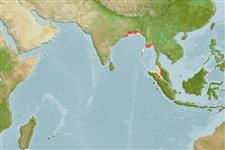Environment: milieu / climate zone / depth range / distribution range
นิเวศวิทยา
เกี่ยวกับทะเล,น้ำเค็ม; ระดับความลึก 0 - 50 m (Ref. 189). Tropical; 25°N - 3°N, 85°E - 101°E (Ref. 189)
Eastern Indian Ocean: northeastern Bay of Bengal, from Calcutta south to the Indian Ocean coast of Thailand, perhaps to Pinang.
ขนาด / น้ำหนัก / Age
Maturity: Lm ? range ? - ? cm
Max length : 16.5 cm SL เพศผู้/กระเทย; (Ref. 189)
เงี่ยงครีบหลัง (รวม) : 0; เงี่ยงครีบก้น: 0; ก้านครีบอ่อนที่ก้น: 41 - 45. Belly with 16 (rarely 17) + 11 to 13 = 27 to 29 keeled scutes from isthmus to anus. Tip of snout on level with upper rim of eye. Maxilla moderate, projecting a little beyond gill cover; first supra-maxilla minute, usually absent; teeth in jaws enlarged, especially in lower jaw. A dark blotch indistinct or absent behind upper part of gill opening; no dark lines along back.
Presumably schooling and inshore. More data needed.
Life cycle and mating behavior
Maturities | การสืบพันธุ์ | Spawnings | Egg(s) | Fecundities | ตัวอ่อน
Wongratana, T., T.A. Munroe and M. Nizinski, 1999. Order Clupeiformes. Engraulidae. Anchovies. p. 1698-1753. In K.E. Carpenter and V.H. Niem (eds.) FAO species identification guide for fishery purposes. The living marine resources of the WCP. Vol. 3. Batoid fishes, chimaeras and bony fishes part 1 (Elopidae to Linophrynidae). FAO, Rome. (Ref. 9822)
IUCN Red List Status (Ref. 130435)
Threat to humans
Harmless
Human uses
เครื่องมือ
Special reports
Download XML
แหล่งที่มาจากอินเตอร์เน็ต
Estimates based on models
Preferred temperature (Ref.
123201): 27.9 - 29.4, mean 28.7 °C (based on 68 cells).
Phylogenetic diversity index (Ref.
82804): PD
50 = 0.5000 [Uniqueness, from 0.5 = low to 2.0 = high].
Bayesian length-weight: a=0.00437 (0.00186 - 0.01024), b=3.11 (2.93 - 3.29), in cm total length, based on LWR estimates for this Genus-body shape (Ref.
93245).
ระดับชั้นอาหาร (Ref.
69278): 3.4 ±0.5 se; based on size and trophs of closest relatives
ความสามารถในการกลับคืนสู่ปกติ (Ref.
120179): ความสูง, เวลาต่ำสุดที่จะทำให้ประชากรเพิ่มขึ้นเป็น 2 เท่าใช้เวลาน้อยกว่า 15 เดือน (Preliminary K or Fecundity.).
Fishing Vulnerability (Ref.
59153): Low vulnerability (10 of 100).
